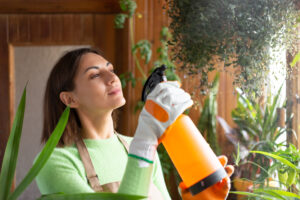Indoor planting is getting popular day by day. For indoor plants, bugs or pests are very harmful and a threat to your plants. To save the plants from bugs, you can use insecticides for your indoor plants. It will help the plants or flowers to be free from bug attacks. You can save your indoor plants by using the right insecticides. During this discussion, we’ll talk about indoor plant insecticide, its importance and which are not harmful to your plants.

Types of indoor plant insecticide:
There are basically three types of insecticides that you can use for your indoor plants; these are;
- Chemical insecticides.
- Natural Insecticides.
- Insecticidal Soap.
1. Chemical insecticides.
Chemical insecticides are synthetic substances used for killing pests, bugs and insects of plants. This has both advantages and disadvantages. That’s why it is very important to identify the pests or bugs before using chemical insecticides. Based on pests or bugs, you should use insecticides. And don’t forget to check the level for safe application.
2. Natural Insecticide for indoor plants :
Natural insecticides for indoors work much better and are much safer than other insecticides. Most used natural insecticides are given below.
- Neem Oil: Neem oil is one of the familiar natural insecticides for plants. It is an effective way to control bugs and pests. It doesn’t kill the insect directly; it stops the reproduction of the insects. Neem oil is also safe for our surroundings. You can easily make neem oil at home. Take one litre of water,1 teaspoon of neem oil and one teaspoon of liquid soap. Then, mix these ingredients properly by shaking. Now, use it under the leaves once a week.
- Diatomaceous Earth: Diatomaceous Earth powder is an effective kind of sand that helps to save plants from various pests and bugs. It is eco-friendly and safe for the environment. While using the powder, choose food-grade Diatomaceous powder. It kills pests like ants, aphids and fungus gnats.
- Garlic Spray: Garlic spray is one of the most used and cheap insecticides for indoor plants. It is quite helpful for the plants and safe for the environment. Besides, it boosts soil quality. It fights with pests like beetles, mites, mosquitos and so on. You can easily make garlic spray at home by using water and cloves of garlic. After strain, you can use it as a spray.
3. Insecticidal Soap for indoor plants :
Insecticidal Soap is a kind of non-toxic soap which kills different pests and bugs. It damages the cell membranes of soft-bodied insects. It’s safe for both plants and animals. And it is safe for beneficial insects. You can use the soap to get rid of pests like Aphids, Whiteflies, spider mites, Mealybugs and other soft-bodied pests.
Usages of insecticides:
Before using insecticides, some steps should be followed.
- Identification of pests or bugs. One should identify the pests or bugs before using. Otherwise, it can be a threat to the plant.
- Read the instructions provided on the label before using insecticides. And follow the instructions step by step.
- Apply the insecticides in the Morning because during the morning the temperature remains cool. Hot temperatures are not a good practice for using insecticides. Sometimes, it may damage your plants.
- Spray the insecticides in the entire plant, especially under the leaves.
- Apply the insecticides carefully, monitor the plants regularly and clean the tools of insecticides.
How to prevent natural insecticide.
- Inspect New Plants: Keep the new plants away from other plants. New ones can infect other plants.
- Keep the Leaves Clean: Remove dead leaves and wipe the leaves with a dummy cloth because dust and grime are harmful to the plants and welcome pests.
- Proper Care: Plants need proper care. Keep your indoor plants where spatial light arrives and water the plants according to need. Don’t overwater the plants, it can birth root rot and fungus gnats.
- Companion Planting: You can keep plants like Lavender, basil, and mint beside your indoor plants. These plants repel pests naturally.
Importance of Indoor Plant Insecticide:
For indoor plants, bugs or pests are a nightmare. Proper care and insecticides can save your indoor plants. For using insecticides, you must detect the pests. Otherwise, it can kill the plant rather than save it. There are some importance of using insecticides. Insecticides can prevent infestation. It will solve the problems and will help to spread others. Pests interrupt the growth of the plants. If you apply the insecticides carefully and according to their needs, your plant growth will increase. Besides, it will protect the plants from damage to leaves and roots from pests.
Insecticides are essential for keeping your indoor plants healthy and pest-free. Whether you opt for chemical, natural, or insecticidal soap solutions, it’s important to choose the right insecticide based on the pest type and your plant’s needs. Regularly monitoring and applying insecticides will ensure your indoor plants thrive. For more tips on indoor plant care, check out our indoor plant care guide.
You can prevent pests by spraying neem oil, using sticky traps, and keeping leaves clean. Also, avoid overwatering, as damp soil attracts insects like fungus gnats.
Take one litre of water, one teaspoon of neem oil and one teaspoon of liquid soap. Then, mix these ingredients properly by shaking. Now, use it under the leaves once a week.
You can easily make garlic spray at home by using water and cloves of garlic. After strain, you can use it as a spray.
Wipe the leaves every 1-2 weeks to remove dust and prevent pests.
Vinegar is too acidic and can damage plants. Instead, use neem oil or a mild soap-water spray to control pests safely.
1 thought on “Indoor Plant Insecticide: Best Natural & Chemical Solutions”